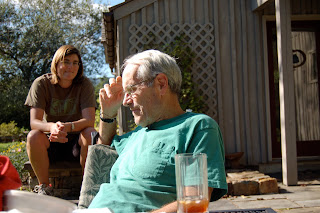I know I said I'd write about my dad’s clothes. But I can’t write about them without first writing about something he told me a couple months before he died. We were sitting outside on the terrace at his northern Virginia farm. It was early October, and across the sloping fields to the north, the trees on the high, lumpy ridge of Rattlesnake Mountain were blazing orange and red. But here in his yard, uniformly green and lush, summer still had one hand in the game. Dad had his checkbook out and was working his way through a small black notebook jammed with envelopes, presumably bills, which he’d labeled “Obligations” in his thick, uppercase handwriting. I didn’t want to distract him, but it seemed important to make light conversation while he plodded through his tasks, to let him know I was there with him, in solidarity. “I’m thinking about starting a blog,” I said tentatively. I always hesitated a little before telling Dad about my writing projects. He had spent most of his professional life as a photographer and editor at National Geographic and had exceptionally rigorous ideas about the difference between meaningful work and fluff. Or so I’d always thought.
Dad looked up from his checkbook, pen in mid-air. Quite possibly many words came out of his mouth— supportive, interested, and encouraging. But the ones I remember were: “Be sure it’s about Something Important.” Dad had a way of talking in emphatically, in capital letters, sort of like the way he wrote, but his pronouncements never came off as forceful, supercilious, or strident. Just quietly assuring, as though he knew What Was Good and Right but wasn’t going to rub it in your face because he had the utmost certainty that if you paid attention and tried hard, you’d eventually figure it out, too.
 |
| Dad, with my sister in October, taking a break from his Obligations |
“Hmm, well it’s about….” I stammered out some vague description involving motherhood and creativity, but I found I could no longer grasp the Great Idea for My Blog. It had gone blurry in my brain, as though I had turned a kaleidoscope too far in one direction and the picture I had once seen so clearly was now splintered into a dozen unrecognizable pieces. Thank God, I wasn’t pitching an editor—the idea would have died an ugly, instantaneous death on my lips.
Dad went back to his Obligations, and I sat there in the still-warm, late afternoon sun, thinking about what he’d said and—I hate to admit it—feeling a little put out. What did he want me to blog about? The state of the Chinese economy? The fallout of the BP oil spill? Foreign relations with Israel? It’s not that I don’t care about those things, or think about them from time to time, but riffing on macroeconomics and diplomacy isn’t me. Maybe I’m self absorbed or lazy or both, but if I have to choose, I’ll err on the side of personal fluff over Seriously Meaningful Global Issues every time.
But now I had Dad’s words in my brain, and there they stayed, smoldering into a big old inferno of self-doubt. It was October 3, and though we didn’t know it then, he had only two months to live. A tumor had clawed its way into his kidney and was snapping up real estate like a slobbery foreclosure agent. I spent many more days with him before he died, talking about a zillion different things: his college jazz band, rooting around the Olympic Peninsula on assignment, the marbly sound of Virginia accents, roadhouses in New Orleans, food he no longer had taste for. But we never had that Last Conversation, the one in which he raises his hand and cocks his head in a sage, fatherly way and says, “Now I want you to always remember…..” and then proceeds to tell me the Secret to Life as he had come to understand it.
Instead, that passing comment might as well have been his dying words for the way it echoed in my brain for time immemorial—or at least a couple months. Is blogging Important? Does it really even Matter? I’d ask myself in the weeks after he died, during those fleeting moments when the grey soupy fog of grief lifted long enough for me to remember. Oh yes, the blog. The truth was, it felt as though nothing much really mattered. We had lost Dad, and so quickly. And so I procrastinated, expertly and with singular focus.
 |
| Dad's Barn, which he Built by Hand, November |
But then one day a couple weeks ago, I just felt like writing. It felt important (lower case i), at least to me. It felt like something I wanted to do, something that might someday—in ways I couldn’t predict any more than we could have predicted his sudden, devastating illness—matter to someone, if only me. Wasn’t that what counted? Dad had always lived his own life, following his own inspiration and ideas, even if they weren’t always popular with the rest of us. Wouldn’t he want the same of me? I logged on and started to clack away, and as I did, I could feel something inside me lighten. It was like swimming out of the weeds and pulling yourself up onto a hot, sun-baked dock to let the warmth of the day worm its way into your skin. It was like someone you love grinning back at you.


